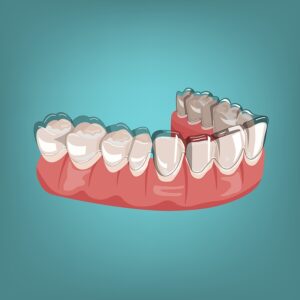If you’re dealing with jaw pain, headaches, and trouble moving your jaw, you know how TMJ disorder can make everyday life hard. One thing that can alleviate these symptoms is proper dental alignment and bite. This leads many to wonder, “Will Invisalign help TMJ?”
Whether you have TMJ symptoms or are just curious about Invisalign, it’s worth looking into how these two topics in oral health relate. Understanding both can help you figure out if Invisalign could be a good way to treat TMJ and alleviate its symptoms.
What is TMJ?
Temporomandibular Joint Disorder, or TMJ as it’s widely known, is a condition that affects the temporomandibular joint—the hinge-like structure that connects your jaw to your skull. This joint is one of the most complex in the body, responsible for allowing your jaw to move up and down, side to side, enabling functions like chewing, talking, and yawning. When something goes awry in this joint or the muscles surrounding it, it can result in TMJ disorder. Let’s delve a bit deeper to understand the symptoms, causes, and the impact it has on day-to-day life.
Symptoms of TMJ
- Jaw pain or tenderness
- Headaches or migraines
- Difficulty in opening or closing the mouth
- Popping or clicking sounds when moving the jaw
- Earaches or tinnitus
- Facial pain
These symptoms can range from mild to severe and can be either intermittent or constant, adding layers of complexity to diagnosis and treatment.
Common Causes
- Misaligned teeth or jaw
- Teeth grinding (also known as bruxism)
- Stress, which often leads to jaw clenching
- Arthritis in the temporomandibular joint
- Injury to the jaw area
- Dental issues such as uneven fillings, crowns, or dentures
Understanding the root cause of your TMJ symptoms is essential for determining the most effective treatment approach. This often involves a thorough evaluation by healthcare professionals who may use X-rays, MRIs, or CT scans to assess the condition of the temporomandibular joint.
Impact on Daily Life
Living with TMJ is more than just dealing with occasional discomfort. It’s a condition that can significantly impact your quality of life. Here’s how:
- Eating: Chewing can become an ordeal, making mealtime less enjoyable and potentially leading to nutritional deficiencies.
- Speaking: Pronouncing certain words may be difficult, which can affect social interactions and self-esteem.
- Sleeping: The pain and discomfort can interfere with sleep, leading to further complications like insomnia, fatigue, and reduced mental well-being.
What is Invisalign?
When it comes to orthodontic treatment, Invisalign has emerged as a revolutionary alternative to traditional metal braces. Designed to straighten teeth and improve bite alignment discreetly, Invisalign has garnered a significant following. But what exactly is Invisalign, how does it stack up against traditional braces, and who is best suited for this treatment? Let’s delve into the details.
How Does Invisalign Work?
Invisalign uses a series of custom-made, clear, removable aligners to gradually shift your teeth into their ideal positions. Unlike traditional braces, which rely on metal wires and brackets to move teeth, Invisalign aligners are virtually invisible and can be removed for eating, drinking, and oral hygiene.
The process begins with a consultation where a healthcare provider evaluates your teeth and develops a treatment plan. Using 3D computer imaging, a sequence of aligners is then created to correspond with each stage of the alignment process. Every two weeks or so, you switch to a new set of aligners, with each set designed to make incremental adjustments to your teeth.
Benefits of Invisalign Over Traditional Braces
- Aesthetic Appeal: One of the most compelling advantages of Invisalign is its virtually invisible nature. The clear aligners allow for discreet treatment, making it a favorite among adults and self-conscious teens.
- Comfort: Without metal brackets and wires, Invisalign aligners are typically more comfortable to wear. The absence of sharp metal components means less irritation to the cheeks and gums.
- Convenience: The removable nature of the aligners allows for easier eating and cleaning. There’s no need to worry about food particles getting stuck or about damaging your braces while brushing or flossing.
- Reduced Treatment Time: In some cases, Invisalign treatment can be quicker than traditional braces, especially with the use of acceleratory techniques.
Will Invisalign Help TMJ?
The question many are asking is straightforward: “Will Invisalign help TMJ?” The answer, however, is not so black and white. While Invisalign is highly effective for correcting mild to moderate alignment issues, its efficacy in treating TMJ is still a subject of ongoing research and clinical experience.
That said, some patients have reported a decrease in TMJ symptoms after undergoing Invisalign treatment. The rationale is that by correcting the alignment of the teeth and improving the bite, Invisalign can relieve some of the strain on the temporomandibular joint, thereby alleviating TMJ symptoms.
Will Invisalign help TMJ? It’s essential to note that Invisalign is not a guaranteed cure for TMJ disorder. The success of using Invisalign as a treatment for TMJ is heavily dependent on the specific characteristics of your condition. Factors such as the severity of your TMJ, your overall oral health, and your discipline in wearing the aligners as recommended can all influence the outcome.
So, who is a good candidate for using Invisalign as a treatment for TMJ?
- Mild to Moderate TMJ Issues: Those with less severe symptoms may benefit more than those with complex or severe TMJ disorders.
- Good Oral Health: Just like any orthodontic treatment, you’ll need to have good oral health before starting Invisalign.
- Commitment to Treatment: The aligners need to be worn for 20-22 hours a day for the treatment to be effective.
So, will Invisalign help TMJ? If you fit these criteria, Invisalign could potentially be an effective treatment for your TMJ symptoms. However, it’s crucial to consult with healthcare professionals for a thorough diagnosis and tailored treatment plan.
Limitations of Invisalign for TMJ Treatment
- Severity of TMJ Condition: Invisalign is generally more effective for mild to moderate cases of misalignment and may not offer significant relief for severe TMJ conditions. More complex issues often require comprehensive treatments like surgical interventions.
- Underlying Causes: TMJ can have various root causes, including stress, arthritis, or even habits like teeth grinding. Invisalign primarily addresses issues related to teeth and jaw alignment and may not be effective if the TMJ symptoms are due to other factors.
Take the First Step Towards TMJ Relief with Orthodontic Excellence
Struggling with TMJ symptoms and seeking orthodontic solutions? Discover relief at Orthodontic Excellence in Puyallup & Bonney Lake, WA, led by renowned orthodontists Dr. Bobby Virk and Dr. Helena Skountrianos. We are proud to be among the TOP 1% Diamond Plus Invisalign Providers globally, specializing in both standard and complex cases.
Whether you’re considering Invisalign, clear, or traditional braces, our team is dedicated to providing personalized care aimed at enhancing your overall well-being, not just straightening your teeth. If you’ve been told you’re not a candidate for Invisalign, come to us for a free second opinion!
Will Invisalign help TMJ? Consult us and start your journey towards a pain-free, radiant smile. Here at Orthodontic Excellence, your comfort and satisfaction are our top priorities.



 Puyallup
Puyallup